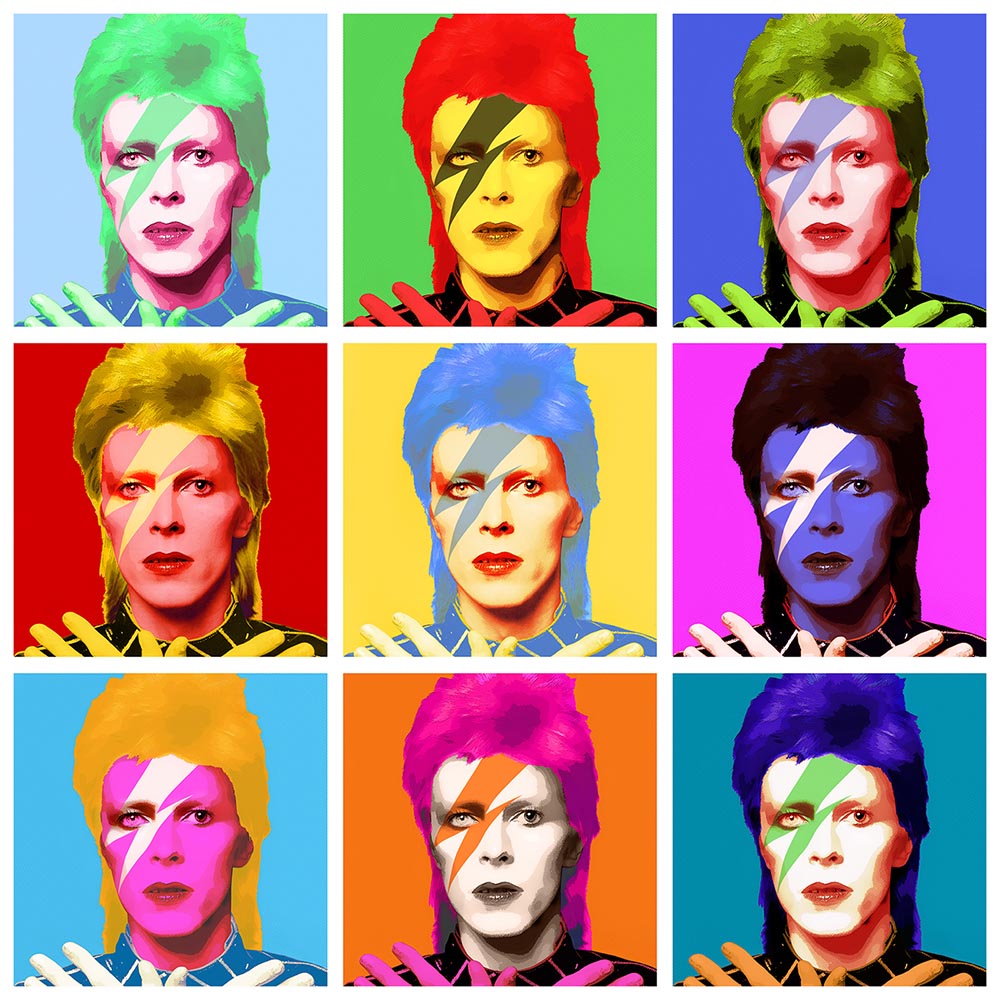
David Bowie pop art by Gil Zetbase (Wikimedia Commons/Gil Zetbase)
The fallacy of the ending is that most things continue still. A loved one dies and still their memory remains. A child leaves home and still their room is in its place. A song ends and still you can hear it, casting itself in your ears, toward the back of the body where sounds lay to rest.
It's the and still that we intuit, the and still that renders an ending so painful, and confusing. And still promises liminality, gleefully so; and still beings are alive and they are not, they are dead and they are not, they are with us, they are of us, they are outside and within us.
We first heard "The Rise and Fall of Ziggy Stardust and the Spiders from Mars" in June 1972, but we can still listen as if it were released this year, as if its messages were not timeless but precisely of this time, urgent and unrelenting. The message: Do not try to lose yourself. Do not believe in endings.
The album was David Bowie's fifth, but it was the first to crossover to the U.S., where listeners, steeped in the flesh of a country that thought itself pious, were looking for a messiah.
When a man who speaks of and from beyond says that the world is ending, they believed it. They wanted it to happen. An ending of the world, in "five years" as the first track opined, would confirm his Godly connection, and would confirm, despite their knowing that they were never supposed to see God, they were right to believe.
During this time, Bowie began to lose himself in Ziggy Stardust, an alter ego, a man of the moon, a creature from afar. Bowie, who'd been born David Jones, who tried to change his name briefly to Tom Jones, found a name that fit, found a persona that could launch him into outer space and rock 'n' roll fame.
Advertisement
And still, Bowie put Ziggy down. It was the summer of 1973.
Ziggy had done all that he could. The message was not received. The message was not: lose yourself in a messenger. The message was not: Fetishize the ending. The message was not: To greet the ending is a brave act. The message was not: nihilistic or existential.
What Ziggy was trying to say, with 11 songs, allegory, motif, jumpsuit and glitter, was the opposite: Don't believe in endings. A belief in endings begets a disbelief in oneself. To disbelieve in oneself before one is gone is to lose oneself. Or, said another way: You exist only with self-belief. Said as Ziggy would say it: "Love is not loving." Ziggy would also say: "If you think we're gonna make it / You better hang on to yourself."
The and still of it is that we are ending and beginning all the time, everywhere, in every space where our bodies are found. The and still of my own life, that I am growing older into a world I am promised is ending, that I am aging into a political climate where policy is thought to have natural limits that lead to natural problems, fueled by inevitabilities too powerful for us, mere humans, to cure.
I am told there are endings to this planet, there are endings to love, to time, to work and play and family. I'm told to live now for there are endings later; say all that I need to say because some day I may not have the chance. I'm told to live with the anticipation of endings; to live as though I am ending. I fear I am becoming my own ending; I have already ended. Have I said all that I needed to say?
Though he sings from outer space, Ziggy brings me down to Earth, this blue place, and tells me that there are two choices, when you're told of an ending: You can leave yourself. Or you can come back to yourself.
It is not wrong to be lost. It's worthwhile to wander, Ziggy says. Time will wait, as time has always waited. He sings it six times in his final plea to listeners, "You're not alone ... Oh gimme your hands."





